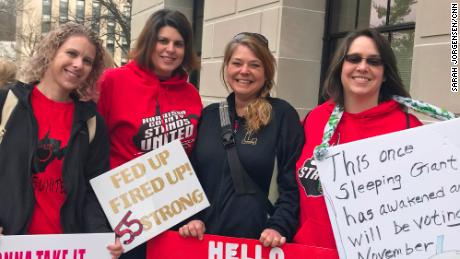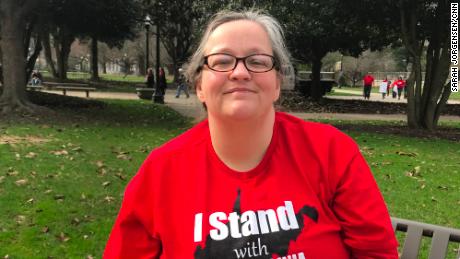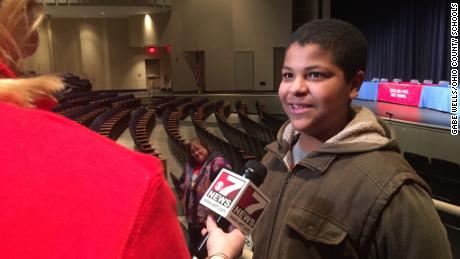Charleston, West Virginia (CNN)At 25, Samantha Nelson is fighting two battles -- one against cancer, and the other for a long-term fix to West Virginia's employee health insurance program.
"It does feel a little bit like an insult," the high school English teacher told CNN about a deal Tuesday to raise teacher pay. "It's like they haven't been hearing anything we've been saying. It's diverting attention from the original problem."
The original problem, she said, is more affordable health care.
Nelson is torn, like many of her fellow teachers, about what may come next after Gov. Jim Justice reached a tentative pay deal with union leaders that was designed to end a four-day walkout and send teachers back to the classroom. But the state late Wednesday said public schools in the majority of counties will remain closed Thursday.
While the agreement provides for a 5% pay raise the first year, it did not include a fix to the Public Employees Insurance Agency (PEIA), which employees say requires them to pay premiums that are too high.
Those costs are at the front of Nelson's mind. The 25-year-old English teacher and cheer coach at PikeView High School in Mercer County was diagnosed in January with stage 4 breast cancer. While Nelson is on her parents' insurance, she will have to switch over to the state-run PEIA this summer.
She worries about the expense of the drugs for the cancer treatment.
"I'm worried about the deductible that I have to meet," she told CNN. "One patch to rebuild my white blood cells will cost about ten grand and right now I'm on a 90/10 coverage with my mom, but I don't know what that will be like under PEIA."
The governor said that the issue of funding insurance would be looked at by a task force, which is far from the immediate fix many educators wanted. The plan was met with a mix of cheers and boos from educators gathered on the steps of the Capitol on Tuesday night when union leaders announced the deal.
"The whole reason why 55 counties have been on strike for four days is to find a permanent solution to fix it, not just for teachers, but for all state workers," Nelson said.
A beleaguered insurance system
The state's insurance plan covers the nearly 200,000 public employees working in West Virginia, according to CNN affiliate WCHS. The insurance fund is listed as being in poor health, according to WCHS.
"You have a 5 or 6 percent rate of inflation, which for health care is not out of line with what you see with a Blue Cross/Blue Shield, that would require about $50 million to $60 million a year just to keep even. When they appropriate only an additional $10 million, you've got $40 million to $50 million worth of harm that you're going to have to pass on to employees," Perry Bryant, a former PEIA finance board member who is now retired, told WCHS.
Educators are complaining about higher co-pays and out of pocket maximums for medical care as their pay remains low.
"We didn't get what we asked for," said Lori Hausvater, a math and special education teacher at Lincoln High School in Shinnston, told CNN.
"The number one thing was we needed a permanent fix to PEIA. It wasn't about the money at all. It was about the insurance fix."
The biggest issue facing the PEIA is funding. Premiums will be frozen for the next fiscal year as a task force created as part of the union deal will figure out a way to fund the plan.
Dale Lee, head of the West Virginia Education Association, said Wednesday that the task force has been formed.
"There are several possibilities that will be looked at for the revenue we need to solve the PEIA issues once and for all," Justice wrote in a letter to state employees. "The possibilities of additional severance taxes on oil and gas, gaming revenue from sports betting, tax dollars being generated from our roads projects, continuing growth in our economy and the possibility of putting the insurance out for competitive bids are just a few; everything is going to be looked at."
Tensions remain at Capitol
On Wednesday, Nelson was among the teachers and school personnel who once again crowded the halls of the state Capitol, demanding further action from the governor and Legislature.
"We're not gonna take it," educators and supporters sang outside the legislative chambers.
The strike was prompted by what educators and staff felt was an inadequate pay raise bill passed by the legislature last week that included a 4% raise over three years for teachers and other state employees. West Virginia is ranked 48th in the United States for average teacher pay, according to the National Education Association.
Schools were still closed as a planned "cooling off day" announced by Justice, in part since some counties had initiated school closures before the deal was announced. But tempers at the Capitol were far from cool, with teachers returning to the building to continue their fight for better insurance.
Betty Maxwell, an English-as-a-second-language teacher in Logan County, where she serves five different schools, told CNN that she left Ohio in 2014 to teach in West Virginia because she believed she would get better benefits, despite taking a pay cut.
Maxwell said she was quickly disappointed with the higher out-of-pocket costs for her insurance, compounded by the fact that she has three children and a husband that she supports.
Now she and her family live paycheck to paycheck. Maxwell was disappointed once again by the deal, because she felt that it was built on promises by the governor, rather than firm action.
"Words are wind," she told CNN. "It's hard to feel hopeful right now because I don't know personally what it's going to take to find a resolution," she said.
Closures will continue Thursday
But Nelson felt more optimistic, calling the deal a "small victory," despite threats from teachers not to return to school as planned. It became apparent later in the day, though, that many schools will stay shut.
As of late Wednesday, schools in 47 of 55 counties had announced closures for Thursday.
"Any teachers that decide not to come back are not doing so because they don't care about the issue," said Nelson. "But if they (state) are being genuine and actually want to come up with a fix, it's not unreasonable that we give them time to do that as long as they follow through."







